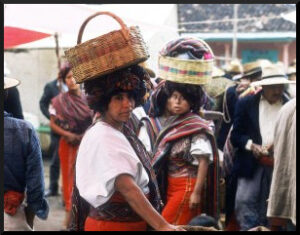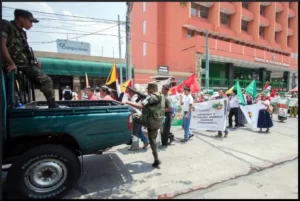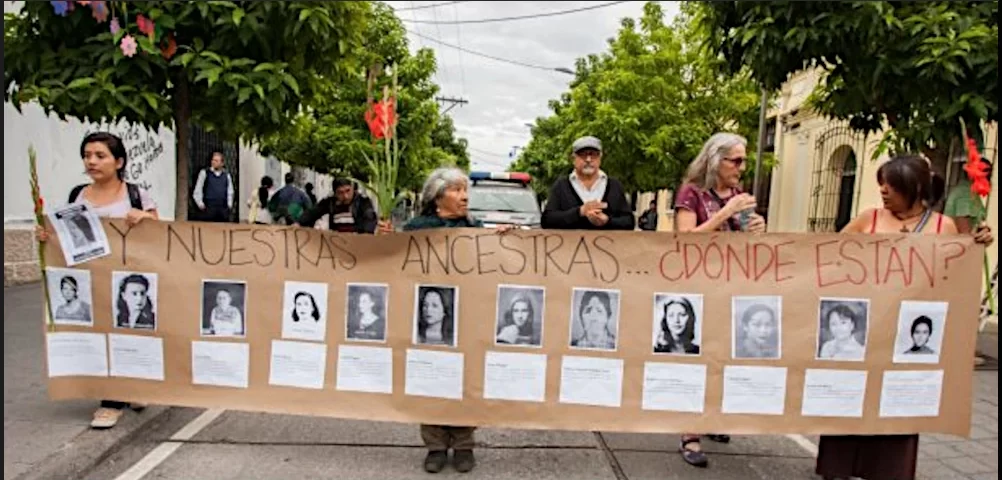By Itzamná Ollantay, published on Resumen, December 28, 2021
Leave us not forget the ‘other’ Central America. A Guatemalan co-worker told me it was like a paradise, in response to an inquiry re whether he misses his home country. He didn’t say why he had to go. [jb]
In the Christmas atmosphere, and the day after the feast of the “Holy Innocents”, the groups that had taken up arms in the Guatemalan National Revolutionary Unity (URNG) and the Guatemalan Creole State, after 36 years of “internal war”, signed the firm and lasting Peace Agreements on December 29, 1996.

The contents of this political commitment to twelve commitments. Of these, perhaps the tenth, the one referring to the recognition of the URNG as a political subject, is the most important. Everything else, including the “shrinking” of the Army, access to land for peasants, the fight against racism, more taxes for the State, etc., are currently in a worse situation, both statistically and on a daily basis, than what happened in the 90s of the last century.
Just to mention some hard data: At the time of the signing of the Peace Accords, more than 50% of the country’s population was living in poverty. By 2018, according to the Ministry of Social Development, more than 61% of Guatemalans were in multidimensional poverty. Currently, Guatemala is a continental champion with children in a situation of malnutrition.
It is true that thanks to the Peace Accords the Army no longer “parades publicly” in the streets. But, with the Peace Accords, the private security industry had a historic growth in the maelstrom of violence in the country. And this private security industry is monopolized by retired military personnel. Security became a lucrative privatized business.
Almost all of the country’s major cities consume corn from Mexico, with serious suspicions of overdoses of the carcinogen glyphosate. At present, all arable land in the country is monopolized for monocultures. Even land provided by the Land Fund, under free market rules, is rented for monoculture African palm plantations. In the 1990s, at least the cities consumed food-safe corn tortillas because peasants had access to land to rent and cultivate.
As for the promise of expanded tax collection, the whitest and most nefarious stories of corruption by evasion and theft of the few taxes were written in the last decade. The country survives thanks to the economic remittances sent by nearly 3 million Guatemalans expelled after the signing of the Peace Accords. Before the pandemic, remittances represented about 17% of the country’s Gross Domestic Product. In 2021, remittances grew by more than 34% compared to 2020.

Corporate state violence persists today. The difference is that there are no longer armed political/military groups to repel such violence. No government in the post Peace Accords era governed without resorting to the use of the “State of Siege or State of Exception” mechanism! The persecution, criminalization and selective assassination of human rights and Mother Earth defenders was and is a constant in the bicentennial Republic that signed and promised peace and bread for its impoverished population.
The successful implementation of the neoliberal political economic system is a correlate of the signing of the Peace Accords. Those who promoted and signed the Peace Accords knew that they were signing the statutes for the implementation of the messianic neoliberal proposal.
Perhaps for this reason, the contents of the 12 agreements do not refer, not even remotely, to the ideas of deep and urgent structural changes in the country such as: plurinationality, participatory democracy, quality of life, redistribution of land/economic democratization, socio-political rights of the peoples and rights of Mother Earth, among others.
But, as nothing happens outside of goodness, neoliberalism, as a correlate of the implementation of the Peace Accords, activated processes of fertile and transformative community resistance, even outside and beyond the theoretical/ideological framework of the Peace Accords.
25 years after the signing of the Peace Accords, peasant communities, indigenous peoples, urban collectives and excluded social sectors, within and from their own dynamics of collective resistance processes, raise and promote the urgent need for a Popular and Plurinational Constituent Assembly process to make structural changes in the country, create the Plurinational State, and move towards better living, even beyond the framework of modernity.
These collective actors, with their proposals, emerge outside the constellations of the institutional political subjects that emerged with the Peace Accords (such as URNG, WINAQ). Not because they felt “betrayed” by the signatories of the Peace Accords, but simply because their historically postponed demands were not part of the contents of the Peace Accords.
The political promise of the “trickle down” or “trickle up” of the neoliberal banquet to the impoverished sectors never happened, nor will it ever happen in Guatemala, or anywhere else in the world. Consequently, plurinational structural changes driven and energized by the peoples and communities that bear the burden of exclusion and neoliberal plundering are urgent.
*Featured Image: Activists march holding a sign asking where are the disappeared during the anti-military march on June 30 [2016]. (WNV(Waging Nonviolence)/Jeff Abbott)
